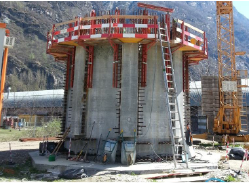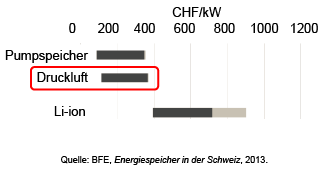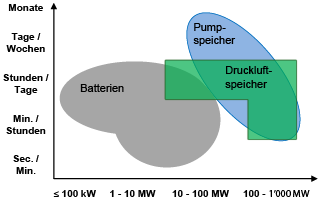SNF-Project – Electricity Storage via Adiabatic Air Compression
High-Temperature Combined Sensible/Latent-Heat Storage Based on Novel Materials for Electricity Storage Using Advanced Adiabatic Compressed Air Energy Storage
Website at SNF: external page Deutsch / external page English
Funding source: external page SNF
Partners: external page ALACAES, external page EPFL, external page PSI, external page SUPSI
Synthesis: external page Deutsch / external page English
Source: external page SNF Youtube channel
Lead – The joint project provides an integrated investigation along a value chain of advanced adiabatic compressed air energy storage (AA-CAES), the only large-scale energy storage concept that at present has the potential to complement pumped hydro energy storage in Switzerland. The project develops the science and technology, and examines the environmental and economic impacts.
Background – With an efficient heat-storage design, the efficiency of an AA-CAES plant is projected to reach 75%. The economics depend upon electric grid economic factors, as well as plant cost, size, and cycle efficiency. Similarly, the net CO2impact will depend upon the CO2 content of the marginal generation units during charging and discharging cycles. The basic concept of compressed air energy storage has been proven with the plants in Huntorf, Germany (321 MW) and McIntosh, USA (110 MW) that have been operating since 1978 and 1991, respectively.
Aim – The overall objectives of the joint project are: (1) to demonstrate a combined sensible/latent-heat storage at an industrially relevant scale for use in AA-CAES and (2) to assess the environmental and economic potential of AA-CAES as an alternative to pumped hydro electricity storage in Switzerland.
Efficient heat storage is the key enabling technology for AA-CAES and therefore the central focus of this joint project. The project proposes the use of combined sensible/latent-heat storage and tackles four issues:
- Design and optimization of high-temperature combined sensible/latent-heat storage,
- Analysis of AA-CAES cycles exploiting combined sensible/latent-heat storage,
- Stable and efficient aluminum-silicon-based phase-change material structures for high-temperature latent-heat storage,
- Sustainability analysis of AA-CAES based on combined sensible/latent-heat storage in terms of environmental and economic factors.
The target audiences of the joint project are companies in the fields of power generation, heat storage, tunnel and cavern construction, and materials manufacturing, energy utilities, commercial and academic research institutions, and cantonal and federal policy and decision makers.

Contribution to the realization of the “Energy Strategy 2050” – Increased reliance on intermittent renewable energy sources will require increased energy storage. AA-CAES is a complementary alternative to pumped hydro electricity storage that is particularly attractive for Switzerland for several reasons:
- AA-CAES has a smaller environmental impact than the pumped hydro approach.
- Pre-existing, unused tunnels and military caverns could be used as high-pressure storage reservoirs.
- Swiss industry possesses unparalleled tunnel-building expertise that could be exploited to build additional storage facilities.
- Under certain circumstances, an AA-CAES plant is estimated to be cheaper to construct than a pumped hydro plant.

Sub-projects
- Analysis of AA-CAES Cycles Exploiting Combined Sensible/Latent Heat Storage and Novel Materials
- Design and Optimization of High-Temperature Combined Sensible/Latent Heat Storage
- Aluminum-Silicon Based Phase Change Material Structures for High-Temperature Latent Heat Storage
Project-related Publications

